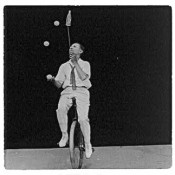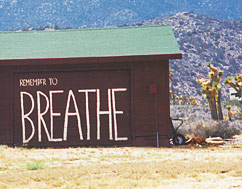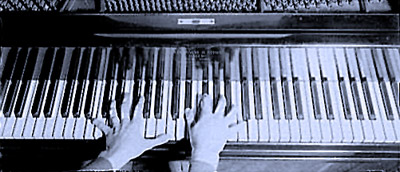
Sensation as Knowledge
When someone startles me I jump. I jump before I know I’m startled. It never works the other way around. I never think I’m startled — and then jump. The body is the first to know something happened. It owns this primary sense of the feeling of what happens. This feeling is knowledge of the body’s state and it does not need words for its knowing.
The mind recognizes this feeling of what happened after the body experiences it. After the mind recognizes the experience the words become available to interpret or talk about it. The words are always the last and farthest from the primary experience.
The same is true of physical reactions to listening. If an exciting performance gives me goose bumps or makes my hair stand on end, I become aware of it after the sensations have happened. If I drum my fingers, they usually start before I notice it. Tears of emotion just happen; they’re not planned. All of these tell us how our body responds to music. We don’t need words to feel music. We just need words if we want to talk about the feeling.
When I walk, each foot repeatedly meets the ground. I am not usually aware of the sensations on the bottoms of my feet because walking is automatic for me. But I do have a choice and I can choose to be aware of those sensations if I want.
Once when I was hiking I remembered a meditation exercise involving awareness of the sensations of the feet. I tried it and I was astounded because I could feel every little stick and pebble, even through hiking boots. I was astounded because I experienced all this sensation and I never knew it was there.
I asked one of my young students to do this during his lesson. After walking on my hard wood floors and occasional throw rugs he said to me, “Oh, that’s why there’s carpet.” He’d never noticed the softness of rugs before.
It’s not a bad thing — this not knowing all the sensations. In fact, it’s a good thing. If we were aware of all this, we’d be overwhelmed and could do nothing but sensate. Our brains are designed to easily ignore many sensations.
And yet, somewhere within us, tucked away out of the awareness of our consciousness, we are paying attention all the time. If we stumble, the body is immediately mobilized to avoid and protect us from an impending fall. No thoughts, no words; the body is aware and acts. If we want to learn to play the piano well, we need greater access to this awareness. We need to learn to relate to this awareness more consciously.
The Body Learns by Doing
 The body does not learn by following the verbal directions of the mind. One may talk in great detail while learning a physical task, but it’s not the talking that’s making the learning happen. The learning happens by the body’s doing.
The body does not learn by following the verbal directions of the mind. One may talk in great detail while learning a physical task, but it’s not the talking that’s making the learning happen. The learning happens by the body’s doing.
The computer analogy is frequently used to describe this process. What the body learns is the information put into it by the act of doing something. Doing is like entering information into the computer. The central nervous system knows no better than your computer whether you put correct or incorrect information into it. Both will give back to you (more or less) what you put in.
If I’m learning to play a scale and I play it wrong, I will continue to play it wrong. The words I say while I’m playing it wrong are irrelevant. I can talk to myself or talk to the computer and it will change nothing. I can get angry with each and it will change nothing. Neither system is verbal and neither system is moral.
In my B major scale example, if I play an A-natural instead of an A-sharp, that’s what I’m learning to do. If I say to myself, “No! That’s not right! It should be an A-sharp!” as I play it wrong, it makes no difference. If I get mad at myself and call myself a stupid imbecile, it still makes no more difference than if I swear at my computer.
Most of us are confused and think this kind of talking helps us learn, as if announcing our mistakes somehow makes us improve. It doesn’t. Perhaps these words are more to protect our own egos as if announcing the mistake first will keep anyone else from accusing us of making one. This is like a preemptive internal attack to ward off an external attack.
Words can be useful though. They can be used to help us diagnose an error and guide us to the difference in the kinesthetic sensation between the correct and incorrect key. For example, “I’m playing an A-natural instead of an A-sharp. How does it feel different under my fingers as I play the A-sharp instead of an A-natural? It’s a black key and, in fact, feels quite different from the white key of A-natural. So this is what I need to feel under my finger when I get here.”
Having reached this point, words are no longer useful. The sensation of the correct key is the information pertinent to playing it right. Feeling the sensation of the A-sharp is the crucial information: sensation that words cannot adequately describe.
This is a simple example but there are many much more complex ones. (For extensive discussion of the dynamics of physical learning as it relates to performance tasks including piano playing see under “A” at the Mechner Foundation.)
At any level of playing, a new insight must be converted into a new physical sensation. It makes no difference what the change is. If the insight comes from understanding a different harmonic sense, the body presents that change. If the insight is a better melodic sense, this also must be carried out physically. If a better rhythmic feeling is discovered, physical action is necessary to make this apparent. There is no way around this fact.
I certainly do not mean that listening is not important or that the listening imagination of a musician is insignificant, but it must be understood that even a great performer has to have the ability to physically convey that vision to the audience. The physical action precedes any sound that comes from the piano. Sound follows physical motion. The performer must learn to physically “listen” to the instrument with the body before any ear can hear the result of that action.
The Sensations of Playing the Piano
 What’s true of the feet in my earlier example is true of the hands. They are amazingly sensitive, and yet we seldom pay attention. If we hope to play the piano well, we must become intimately aware of these sensations.
What’s true of the feet in my earlier example is true of the hands. They are amazingly sensitive, and yet we seldom pay attention. If we hope to play the piano well, we must become intimately aware of these sensations.
Jacques Lusseyran, who became blind as a child, writes eloquently of the sensory life of the hands. His words are some of the finest instructions for pianists that I’ve ever encountered. If we feel our hands as he talks of feeling his, playing will be a physical joy that most beginning and intermediate adult students never suspect and hence, don’t know to seek. From And Then There Was Light (Parabola Books, 1963):
…Fortunately, before long I realized that instead of becoming useless they were learning to be wise. They only needed time to accustom themselves to freedom. I had thought they were refusing to obey but … all I needed was to leave my hands to their own devices. I had nothing to teach them, and besides, since they began working independently (of the eyes) they seemed to foresee everything…(p. 25-6)
As soon as my hands came to life they put me in a world where everything was all exchange of pressures … As a child I spent hours leaning against objects and letting them lean against me. Any blind person can tell you that this gesture, this exchange, gives a satisfaction too deep for words…(p. 27)
You cannot keep your hands from loving what they have really felt, moving continually, bearing down and finally detaching themselves, the last perhaps the most significant motion of all. (p. 28)
People who only listen to music are frequently unaware of the importance of the sensual relationship that exists between the pianist and the piano. Charles Rosen is justifiably noted as one of the most learned pianists of our time. He has written many excellent books on music. Knowing and appreciating this reputation, I was surprised and pleased to come upon these comments in the New York Review of Books, October 21, 1999:
There has to be a genuine love simply of the mechanics and difficulties of playing, a physical need for contact with the keyboard, a love and a need which may be connected with a love of music but are not by any means totally coincident with it. This inexplicable and almost fetishistic need for physical contact with the combination of metal, wood, and ivory … that make up the dinosaur that the concert piano has become is, indeed, conveyed to the audience and becomes necessarily part of the music, just as the audience imagines that the graceful and passionate gyrations of the conductor are an essential component of musical significance.
Not only is this relationship a physical pleasure, it can be a direct expression of the mind of the body which completely bypasses the mind of words and concepts as Rosen explains in the same article.
It is easy enough to demonstrate that this opposition of body and mind is unrealistic if we consider improvisation. It may not be completely true to say that the fingers of the pianist have a reason of their own that reason knows not of, because improvisation is not exactly unconscious, but it is clear that the fingers develop a partially independent logic which is only afterward ratified by the mind. Perhaps one should add that interpretation can be as much an instinctive muscular reaction of the body as a reasoned approach.
An even more extreme statement by the Norwegian pianist Leif Ove Andsnes appears in an interview with Matthew Gurewitsch in the Wall Street Journal, Friday, March 8, 2002:
So often people think how we play is something we decide… but our physicality is so much part of what we are… People say that Vladimir Horowitz — the most explosive pianist you can imagine — had hands that could make any sound he heard in his head. I thing quite the contrary. His hands were very quirky hands. He had to think hard how to use them. I think his expression came more from the imagination of his hands than any kind of musical thinking. His hands created his unique style.
This relationship between performer and instrument is vital in making music. If this relationship doesn’t exist, the piano is always felt as an alien thing to be overcome and mastered.
If you have become estranged and afraid of your body and have gotten lost in the world of words, finding this relationship with the piano is not an easy thing to do. Yet to miss this relationship is to miss one of the joys of playing piano. To not know this relationship is to make music from the outside in rather then from the inside out; to miss this relationship is not to know the dance of the body that creates the music that others can dance to.
Because children are so well connected with their bodies, teachers used to working with children won’t understand the need to help adult students form this physical relationship. If we teachers don’t overtly help our adult students to know and establish the relationship of the body to the piano, our students will be lost in a mental relationship with the piano. This kind of relationship leaves them feeling out of control, lucky when things work, obsessing in a linear fashion and forced to observe their efforts without the understanding of how to actively intervene.
